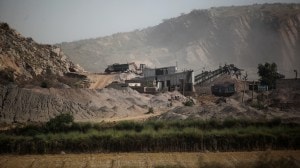This just isn146;t cricket
How my heart goes out to Amrit Mathur, my old jogging mate at South Delhi8217;s Siri Fort Sports Complex. The hugely popular spokesman of t...

How my heart goes out to Amrit Mathur, my old jogging mate at South Delhi8217;s Siri Fort Sports Complex. The hugely popular spokesman of the BCCI must feel like one of those soldiers in Kargil, pressing up the hill without proper shoes, clothing, weaponry. You see him on your television screens, on the front pages, so earnestly checking out Pakistan8217;s cricket grounds if they will be safe for his team this March. And he does it all with bare hands. No sniffer dog, mine detector, Geiger counter, whatever. He would have to be a brave man to come back and now say that he finds the security arrangements adequate.
It is about time we got a bit serious on this, because cricket is serious business. Either we want to go and play in Pakistan this spring, or we don8217;t, either way, let8217;s decide only on cricketing reasons. If we do, we should place our trust in Pakistani security, pray for good luck off, and on, the field, and carry on. If for whatever reason 8212; tired players, tight itinerary and, most ludicrous of all, the likely effect of a bad performance on the precious feel-good factor 8212; we don8217;t, we should be honest about it and say a quick no. We know that this is a government of security junkies. But to use security as an excuse for not playing cricket in Pakistan when our prime minister was not shy of spending the better part of a week there two months earlier would convince no one. It would make us look like a nation of wafflers, our cricketers like a bunch of wimps and our diplomacy wishy washy. Who is to guarantee, then, that the security situation in Pakistan would get better by May, the month now being suggested for a post-election series? Unless, indeed, the argument is that then the snows begin to melt and so all the bad guys would be sprinting across the LoC and getting busy with their own fun and games in the Valley.
Over the years, besides the perils they face on the field, India8217;s cricketers have had to live with a scourge unique to their country: the mixing of cricket with diplomacy, of being used as pawns in foreign policy. This takes away the focus and concentration which our players must have while confronting the opposition in such keenly fought engagements. This also clouds our judgement. In 1978, Morarji Desai8217;s government decided to signal a thaw with Zia8217;s Pakistan by sending a team under Bishen Bedi there. You ask any member of that team and they will tell you of the pressures this additional diplomatic responsibility brought them under. They had to constantly look and behave like good guys, stay locked up in their rooms, with social outings entirely curtailed, and had to swallow the most horrendous umpiring decisions with straight faces.
The only one not to be weighed down was late Lala Amarnath but he was not on the field but in the commentators8217; box while two of his sons played for India. He gave all diplomatic restraint a go the moment Mohinder was given out in his nineties, caught in the slips when his bat was hidden well behind his pads. Asked by his Pakistani co-commentator to speak about the decision, Lala said, sorry, 8220;I will not comment on that decision because and then he paused for a long while because Mohinder is my son.8221; Many years ago, I reminded Lala of this slip-up and he said, of course, it was okay, it was such a lousy decision. Except that he was pulled up by three different officers from the Indian mission, besides by 8220;the high-ups in Delhi8221;. Then he added in a manner so typically forthright of him: 8220;They would never leave it to us cricketers to find an answer to the Kashmir issue. Then why must they tell us how to play the game so their bloody friendship business is not affected?8221;
My recollection of this conversation is pretty good, except that I have been careful to translate some of Lala8217;s Punjabi into more diplomatic English. And he had a point. A modern-day cricket series is hard ball. You cannot mix it up with the subtle, cynical needs of diplomacy. You play the game the hard way,to win, are angry when you lose, jubilant when you win. Don8217;t confuse all this with the niceties of diplomacy. God knows we take our cricket much too seriously in these parts but you still don8217;t want to carry the additional burden of knowing that your larger national interest hangs by the slender thread of your performance on, and off the field. Other Indian cricketers have felt similarly weighed down on other occasions. Ask Kapil Dev. He is too much of a nice guy to say this but had the 1992-93 series in South Africa not been billed as Friendship Series, loaded with the baggage of bringing the first opening to post-apartheid South Africa, would he have taken that infamous knock in his shin from Kepler Wessels8217; bat with such equanimity? Imran Khan once said to me that to him that one single incident confirmed that Kapil was, deep down, a wimp. But if Kapil tells you the truth, he was also probably weighed under the responsibility of keeping the 8220;friendship8221; spirit of that series alive.
In the 1982-83 series in Pakistan once again the team was being beaten, bored, confined to their hotel rooms and homesick as hell. The umpiring was, well, nothing unusual, crowds wanted your blood, and no social outings except stiff official receptions. One of the all-time great stories of Indian cricket folklore goes something like this. Both teams, in their blazers and ties, had been lined up to be introduced to General Zia at his official reception. He had done his homework. He knew that one of the Indians had missed the match India had just lost probably because of a pulled hamstring. As he shook hands with the player, Zia said something like, Hullo, how is your leg? The story goes that unable to take the farce any longer, the player looked the general mischievously in the eye and said, 8220;Hairy.8221;
I don8217;t know if this Indian team has somebody with that kind of wit, or cheek. But if you asked them, they will tell you to keep politics out of their lives and let them get on with the game. It is good enough for them that the government has decided there is no ban on India playing Pakistan in Pakistan. The rest, where they play, when, the itinerary, the details should be left to the world of cricket.
The last thing you need is poor Amrit Mathur and other BCCI dadas sniffing around the Pakistani cricket grounds for hidden mines and explosives. They would rather be left to worry about the lethal stuff that may be thrown at them across the 22-yard strip in the middle. In any case they would be better equipped to prepare to counter the cricketing threats and perils their boys would face rather than anything Maulana Masood Azhar8217;s boys might fling at them.
Postscript: On the eve of the Test match against the West Indies in the fall of 1983 at Ferozeshah Kotla Bishan Bedi was speaking at a function in Pragati Maidan for the release of Sunil Gavaskar8217;s Runs and Ruins. This is when terrorism had just picked up steam in Punjab and there was a threat to the match too. Also, the West Indies had come in to avenge the World Cup loss a month earlier, with Marshall and Holding bowling like demons. Somebody asked Bishan if he feared a terror attack at Kotla. 8220;There will be a massacre, alright,8221; he said. 8220;But more likely on the field than off it.8221; It is a different matter that India saved that match quite honourably with Vengsarkar and Gavaskar scoring hundreds and the latter turning out, for the first time, in his skull cap and unleashing the hook shot after more than a decade of self-denial.
Write to sgexpressindia.com
- 01
- 02
- 03
- 04
- 05































